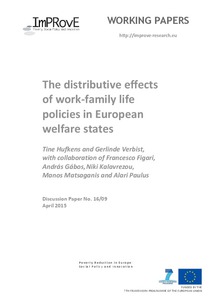The distributive effects of work-family life policies in European welfare states
"An aspect that has only recently received attention in the study of policy measures aimed at supporting families with young children in their work-family life balance is its distributive impact. Are these measures used by poor and rich families alike, or is there a ‘Matthew effect’ at play, in...
| Main Authors: | , , |
|---|---|
| Institution: | ETUI-European Trade Union Institute |
| Format: | TEXT |
| Language: | English |
| Published: |
Antwerp
2016
ImPRovE |
| Subjects: | |
| Online Access: | https://www.labourline.org/KENTIKA-19105062124919232449-The-distributive-effects-of-wo.htm |
| Summary: | "An aspect that has only recently received attention in the study of policy measures aimed at supporting families with young children in their work-family life balance is its distributive impact. Are these measures used by poor and rich families alike, or is there a ‘Matthew effect’ at play, in the sense that poor families are underrepresented in using such measures? In order to perform such an evaluation one needs to have a measure of both cash and in-kind benefits related to policies that help families cope with the care of young children and job expectations. In-kind benefits are offered mainly in the form of subsidized early childhood education and care (ECEC), for which an appropriate cash equivalent has to be derived. As the value of in-kind benefits from publicly provided services is not included in the EU-SILC data, we derive them for this paper in line with earlier studies (e.g. Matsaganis and Verbist, 2009; Vaalavuo, 2011; Förster and Verbist, 2012; Van Lancker, 2014; Van Lancker and Ghysels, 2014). In comparison to these earlier studies, however, our analysis is much more fine-grained as we use the microsimulation model EUROMOD to include more precise estimates of parental fees and related tax-benefit policies; thus, we will have a better estimate of the net in-kind benefit households derive from ECEC services. We focus on policy measures going to children under compulsory schooling age for a selection of seven EU-countries. These improved estimates allow us to analyze the work-family polices from three perspectives: 1) how do the distributive characteristics of cash and in-kind benefits compare to one another in this domain?; 2) how do countries compare to one another in their policy perspective in terms of supporting outsourcing or home-based care for young children?; 3) what is the balance between private and public efforts for outsourced childcare across countries? Our results show that including net fees in the analysis attenuates the Matthew effect, in the sense that net fees are relatively more heavy for richer households than for the poor. There is, however, considerable cross-country variation." |
|---|---|
| Physical Description: | 82 p. Digital |

